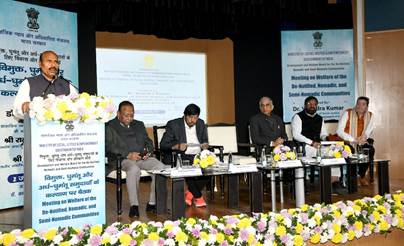Dr. Virendra Kumar Chairs Stakeholder Meeting on Welfare and Development of De-notified, Nomadic, and Semi-Nomadic Communities
The event concluded with a collective resolve to prioritize unified actions and adopt innovative approaches in addressing the persistent challenges of DNT communities.

- Country:
- India
Union Minister for Social Justice and Empowerment (SJ&E), Dr. Virendra Kumar, chaired a critical meeting today in New Delhi, focusing on the welfare and inclusive development of De-notified, Nomadic, and Semi-Nomadic Communities (DNTs). The meeting brought together a diverse group of stakeholders, including MoS SJ&E Shri Ramdas Athawale, senior officials from the Department of Social Justice and Empowerment (DoSJE), and other prominent dignitaries to discuss strategies and solutions for the challenges faced by these marginalized communities.
The event provided a dynamic platform for peer learning, with representatives from Maharashtra, Gujarat, Rajasthan, Madhya Pradesh, and Tamil Nadu presenting innovative initiatives and successful practices in uplifting DNT communities. These states shared their comprehensive strategies to address the unique challenges faced by these communities, which often include limited access to education, healthcare, and stable livelihoods.
The meeting also featured key contributions from officials in the Ministry of Health and Ministry of Rural Development, along with representatives from 14 SEED partner agencies and members from the National Backward Classes Finance and Development Corporation (NBCFDC) and the National Scheduled Castes Finance and Development Corporation (NSFDC).
Key Focus Areas and Commitments
The discussions during the meeting emphasized the importance of knowledge sharing and mutual learning, highlighting successful state-led initiatives to ensure inclusive growth and development. A significant part of the deliberations was centered on enhancing access to quality education, improving healthcare services, and fostering sustainable livelihoods for DNT communities, which have often been overlooked in mainstream development schemes.
Moreover, participants underscored the transformative role that technology and digital platforms could play in ensuring better access to government schemes and services for marginalized groups. By leveraging these tools, the delivery of welfare programs can become more efficient, transparent, and far-reaching.
Strengthening Collaborative Partnerships
The meeting reinforced the need for collaborative partnerships between various stakeholders, including government bodies, private sector entities, and non-governmental organizations, to effectively address the systemic issues faced by DNT communities. The role of state-level DNT associations was also acknowledged, with the aim of encouraging more grassroots participation in the design and implementation of policies.
Conclusion: Towards Inclusive Development
The event concluded with a collective resolve to prioritize unified actions and adopt innovative approaches in addressing the persistent challenges of DNT communities. There was a shared commitment to unlocking the potential of these communities by improving access to resources and opportunities, ultimately contributing to a more equitable and impactful future for all. The discussions also reflected a strong national commitment to the welfare of these communities, aiming for inclusive development that leaves no one behind.
- READ MORE ON:
- Dr. Virendra Kumar










